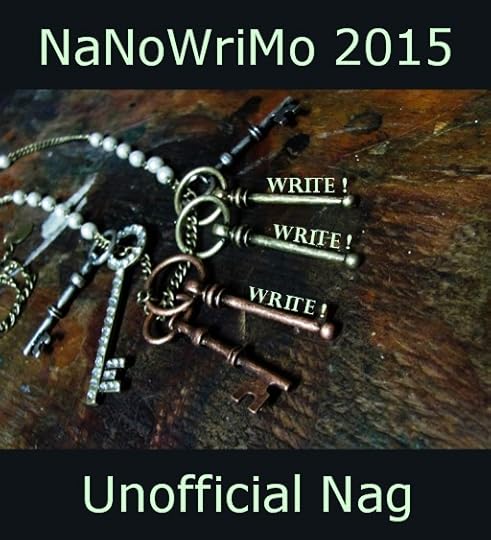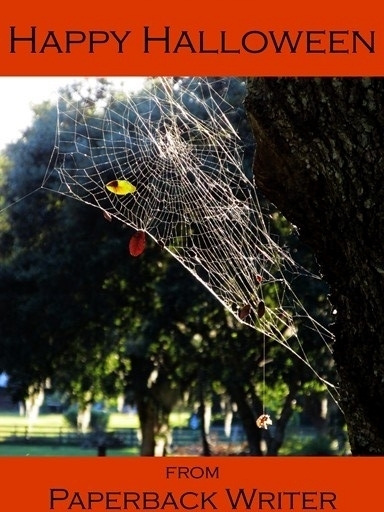S.L. Viehl's Blog, page 40
November 10, 2015
Blockbuster Ten
Ten Things You Can Do to Bust Writer's Block
Break It Promise: Make this deal with yourself: if you write for the next thirty minutes, you can take thirty minutes off to do something fun. If thirty minutes seems too long, try fifteen or ten.
Celebrate: Throw yourself a Writer's Block party with your real-life people. Order in Chinese or Pizza. Ask everyone for suggestions on how to beat your block. Offer silly prizes for the best suggestions.
Change POV: Switch the POV to another character. Try telling your story from the point of view of other-than-protagonist characters, too, like a secondary, a hidden character, or the antagonist.
Clean: This is my favorite method for getting back on track with writing -- I tidy a room, vacuum the carpet, dust, or do some other housework for an hour. Cleaning always works out my frustrations and makes me feel better. By the time I'm finished I always feel like I've gotten rid of the internal cobwebs and dust bunnies, too.
End it: Stop writing whatever you're working on and write the very last chapter of that story.
Move On: Often a block is caused by a difficult-to-write scene. If that's the case, tag the place for the scene with a short reminder (i.e. [write fight scene between A and B]) and move on to the next.
Musical: Stop writing and listen to some inspiring music for fifteen minutes. Or take a break and put together a playlist for your story, and then listen to the piece you choose for the place where you stopped in the story and use the music to help you better visualize your scene.
Relocate: Take your writing and go somewhere else to write. Try different and new locations like a park, a library, or a cafe you've never visited. See where you're most productive and write there for a week.
Shutdown: If you can't write because your story seems trite, you've lost interest in it, you can't figure a way out of a plot problem, your characters have turned into wallpaper or any of a thousand other causes for your writer's block, why bother? Shelve the story and start a new one. You can always go back to the story you shelve if you want to have another go at it.
Timely: This is a way to start short and build on what you can do. Begin by writing five words. Take a short break. When you come back, write ten more words. Take a short break. When you come back, write twenty more words. Take a short break. Continue on by doubling your wordcount every time you come back from a break until you're back writing at your optimum rate.
Break It Promise: Make this deal with yourself: if you write for the next thirty minutes, you can take thirty minutes off to do something fun. If thirty minutes seems too long, try fifteen or ten.
Celebrate: Throw yourself a Writer's Block party with your real-life people. Order in Chinese or Pizza. Ask everyone for suggestions on how to beat your block. Offer silly prizes for the best suggestions.
Change POV: Switch the POV to another character. Try telling your story from the point of view of other-than-protagonist characters, too, like a secondary, a hidden character, or the antagonist.
Clean: This is my favorite method for getting back on track with writing -- I tidy a room, vacuum the carpet, dust, or do some other housework for an hour. Cleaning always works out my frustrations and makes me feel better. By the time I'm finished I always feel like I've gotten rid of the internal cobwebs and dust bunnies, too.
End it: Stop writing whatever you're working on and write the very last chapter of that story.
Move On: Often a block is caused by a difficult-to-write scene. If that's the case, tag the place for the scene with a short reminder (i.e. [write fight scene between A and B]) and move on to the next.
Musical: Stop writing and listen to some inspiring music for fifteen minutes. Or take a break and put together a playlist for your story, and then listen to the piece you choose for the place where you stopped in the story and use the music to help you better visualize your scene.
Relocate: Take your writing and go somewhere else to write. Try different and new locations like a park, a library, or a cafe you've never visited. See where you're most productive and write there for a week.
Shutdown: If you can't write because your story seems trite, you've lost interest in it, you can't figure a way out of a plot problem, your characters have turned into wallpaper or any of a thousand other causes for your writer's block, why bother? Shelve the story and start a new one. You can always go back to the story you shelve if you want to have another go at it.
Timely: This is a way to start short and build on what you can do. Begin by writing five words. Take a short break. When you come back, write ten more words. Take a short break. When you come back, write twenty more words. Take a short break. Continue on by doubling your wordcount every time you come back from a break until you're back writing at your optimum rate.
Published on November 10, 2015 04:00
November 9, 2015
PBW's Book of the Month
 Now that I'm home I can catch up on my blog posts, like my pick for book of the month for October, which is Only a Kiss by Mary Balogh.
Now that I'm home I can catch up on my blog posts, like my pick for book of the month for October, which is Only a Kiss by Mary Balogh.Only a Kiss is the sixth novel in the Survivors' Club series, and tells the story of Lady Imogene Barclay, the only female member. To give you a short version of the series premise, the club is formed of seven people who were injured either physically or emotionally (sometimes both) during the Napoleonic Wars and came together afterward to heal and help each other. Imogene is the only female Survivor, and since she was captured by the French along with her husband, the Earl of Hardford, I thought I had her story figured out before I began reading the book. All you really know about Imogene from the previous books, however, is that she witnessed her husband's death, and that she never talks about it. When she's not meeting up with the other Survivors Imogene lives very quietly on her husband's estate in Cornwall, at least until the new Earl, Percival Hayes, decides to finally come and see what he'd inherited.
Mary Balogh is our generation's Jane Austen, and this novel showcases why. In addition to being extremely well-written and deviously plotted, it offers a bit of a role-reversal, with a heroine struggling to deal with her past while being haunted by it, and a lovely, happy hero who shows up to help and change everything in the process. Don't make assumptions about Imogene, either, because when you do finally discover exactly why she's a Survivor it will stun you. I found this story a beautiful read, as well as one that made me cry (the revelation is a heart-wrencher) but that's all part of the very real magic Mary instills in her work. All of the novels in this series are basically standalones, so you don't have to read the previous five to keep up.
Here's where you can buy a copy:
Barnes & Noble
Amazon
Published on November 09, 2015 04:00
November 8, 2015
Just Write Sunday Edition

Today I'm off to write something new and post it online before midnight. Everyone inclined to do the same is invited to join me.
My link: More on Ghost Writer (click on the title to go to the .pdf), with new material beginning on page 151.
For more details on Just Write, click here to go to the original post.
Image credit: My kid. :)
Published on November 08, 2015 04:00
November 7, 2015
NaNoNag #1
 Today wraps up the first week of National Novel Writing Month, much of which I actually spent on the road and rubbing shoulders with other creative types while sorting out what we need for the daughter's college transfer. At one point we went on a tour that allowed us to walk through several classrooms filled with working students, and the one thing I noticed nearly all of them had was that lovely determined focus; some didn't even seem to realize a dozen strangers were traipsing through their work space.
Today wraps up the first week of National Novel Writing Month, much of which I actually spent on the road and rubbing shoulders with other creative types while sorting out what we need for the daughter's college transfer. At one point we went on a tour that allowed us to walk through several classrooms filled with working students, and the one thing I noticed nearly all of them had was that lovely determined focus; some didn't even seem to realize a dozen strangers were traipsing through their work space.I envy that, particular now that I'm back home and dealing with my own distractions. Today we had the annual pre-holiday carpet cleaning, and half my house is in shambles, and everyone is also home and underfoot. I love these people, and I will get my house in order again, but I also need to write. So I've locked myself in the office (for now) and if things don't quiet down later I will pack up the laptop and head over to the library.
I'll do this because I must. Yes, I am mom and housewife and domestic crisis manager, but I'm also a writer. No one else in the family is a writer, and while they say they understand that I can't magically produce two thousand words by snapping my fingers, they actually don't.
It's all in how they measure my work time. It will only take fifteen seconds for them to ask me where they left their car keys, and then two minutes for me to help them look for them. Never mind that the two minutes and fifteen seconds disrupts an entire hour of work, and breaks my concentration, and takes my brain and my bod away from the work. Surely I can put the work aside for an hour to cook a meal for them; they're hungry, and after all I'm just writing. And of course I can always go back and start again once I've fed them or found their misplaced thing or done whatever else they want.
This, after seventeen years of me writing professionally, seems ludicrous -- but it is what they really think, and that is what will never change unless someone else in this family decides to become a pro writer (not holding my breath for that.)
While you're trying to write your NaNo novel you'll probably have something similar happen (if it hasn't already.) It's easy to get flustered and frustrated and even angry with unwanted distractions. Don't let them rattle you or throw you off course. Be patient and explain -- one time -- that you're working. Ask for their support. If they can't respect that, or they are unable or unwilling to support you, pack up your writing and relocate to a place where you can get some work done.
Stay at home parents, I know you can't always pick up and go, so you might have to resort to the alternative of waiting until they're at school or down for a nap or the night. Or you may have to get a sitter, or just write in ten- and fifteen-minute snatches while they're quiet. With two in diapers I penned my first published book during half-hour writing sessions at their nap time and one hour after they were in bed, so believe me, I understand.
Part of the reason writing is hard work is that sometimes it's hard to work. Keep your focus on what you can do, and let go of what you can't. Create new opportunities to write: give up television, get up an hour earlier, write during your lunch hour, etc. Hang on to your focus, and your determination. You can't snap your fingers and make that two thousand words appear out of thin air, but you can find the time and chance to write them in peace.
Published on November 07, 2015 04:00
November 6, 2015
Dream Pursuit
This gorgeous short film reminds us that the chase is often as wonderful as the prize (with background music, for those of you at work):
Viridian from Harshit Desai on Vimeo.
Published on November 06, 2015 04:00
November 4, 2015
Off to be Mom

My daughter asked me to spend a couple days with her to sort out some college-related stuff, so I'm unplugging today and tomorrow to do that. See you on Friday.
Published on November 04, 2015 04:00
November 3, 2015
Lost in the Details
I'm nearly finished a holiday gift project that I started when I finished the tropical quilt, and for once I'm trying to edit myself a little more with the embellishments. Curbing my enthusiasm for beading and lace helps prevent the stitchwork from getting buried. For example, one panel ready for embellishment started out looking like this:

And now is looking like this:

I originally had lace motifs all over the blocks, on the intersecting corners of the ribbons, etc. It looked very fancy -- and very crowded. More is not always better; sometimes it's just more. So I limited myself to two lovely motifs so my embroidery wouldn't get lost in the details.
Here's another example of less versus more:

When you're telling a story, you're giving a reader a lot to remember just with the people, places and plot you create. So when you do get into the details, remember to choose carefully what you embellish, and make sure all your other elements don't end up eclipsed by the fripperies.

I tend to write like I quilt, too -- bare bones first, establishing a solid foundation by focusing on the dialogue and characters and action. Later during my daily edit I'll add the embellishments (although not always; sometimes a scene comes out on the page with all the sensory bells and whistles from the get-go.)
How do you handle writing all the little details? Share your wisdom in comments.

And now is looking like this:

I originally had lace motifs all over the blocks, on the intersecting corners of the ribbons, etc. It looked very fancy -- and very crowded. More is not always better; sometimes it's just more. So I limited myself to two lovely motifs so my embroidery wouldn't get lost in the details.
Here's another example of less versus more:

When you're telling a story, you're giving a reader a lot to remember just with the people, places and plot you create. So when you do get into the details, remember to choose carefully what you embellish, and make sure all your other elements don't end up eclipsed by the fripperies.

I tend to write like I quilt, too -- bare bones first, establishing a solid foundation by focusing on the dialogue and characters and action. Later during my daily edit I'll add the embellishments (although not always; sometimes a scene comes out on the page with all the sensory bells and whistles from the get-go.)
How do you handle writing all the little details? Share your wisdom in comments.
Published on November 03, 2015 04:00
November 2, 2015
Flash Sub Op
Spotted this no-free open call/competition for extremely short flash submissions over in the Paying Markets forum on AbsoluteWrite.com:
"Haunted Waters Press seeks exceptionally small works of flash fiction to be showcased in Penny Fiction, a regular feature of the literary journal, From the Depths. Stories will also appear in the Penny Fiction Poster Collection.
GUIDELINES
The Penny Fiction Flash Fiction Competition will be held in three rounds.
Round One: November 1, 2015 - December 31, 2015
Round Two - January 1, 2016 - February 29, 2016
Round Three - June 1, 2016 - July 31, 2016
We seek flash fiction stories told in exactly 16 words. No. more. No less.
One entry per author, per round. Multiple stories per entry encouraged.
Winning Entries announced within 14 days of the close of each round.
No entry or reading fees.
See full Contest Rules below.
GRAND PRIZE
One Grand Prize Winner Per Round
$25 and publication in the 2016 issue of From the Depths plus online Featured Author Interview
RUNNERS UP
Publication in the 2016 issue of From the Depths plus Author promotion via Facebook, Twitter and HWP News.
Thank you for considering Haunted Waters Press! We look forward to reading your work."
For more info, see their guidelines page here.
"Haunted Waters Press seeks exceptionally small works of flash fiction to be showcased in Penny Fiction, a regular feature of the literary journal, From the Depths. Stories will also appear in the Penny Fiction Poster Collection.
GUIDELINES
The Penny Fiction Flash Fiction Competition will be held in three rounds.
Round One: November 1, 2015 - December 31, 2015
Round Two - January 1, 2016 - February 29, 2016
Round Three - June 1, 2016 - July 31, 2016
We seek flash fiction stories told in exactly 16 words. No. more. No less.
One entry per author, per round. Multiple stories per entry encouraged.
Winning Entries announced within 14 days of the close of each round.
No entry or reading fees.
See full Contest Rules below.
GRAND PRIZE
One Grand Prize Winner Per Round
$25 and publication in the 2016 issue of From the Depths plus online Featured Author Interview
RUNNERS UP
Publication in the 2016 issue of From the Depths plus Author promotion via Facebook, Twitter and HWP News.
Thank you for considering Haunted Waters Press! We look forward to reading your work."
For more info, see their guidelines page here.
Published on November 02, 2015 06:20
November 1, 2015
Just Write & NaNoWriMo
 Today we officially kick off National Novel Writing Month, the annual writing event during which scribes around the world spend the next thirty days working on a novel. To win, participants must write fifty thousand words in one month (no easy task) while cheering and being cheered on by their writer pals. It's utter madness, too, but that's kind of the point.
Today we officially kick off National Novel Writing Month, the annual writing event during which scribes around the world spend the next thirty days working on a novel. To win, participants must write fifty thousand words in one month (no easy task) while cheering and being cheered on by their writer pals. It's utter madness, too, but that's kind of the point.Work prevents me from officially joining in this year, but I will be writing 51K during November for my clients, so consider me on board in spirit, anyway. Throughout the month I'll be offering what links, resources, ideas and words of wisdom I can to help out. As I do every NaNoWriMo I've also put up my writing how-to e-book, Way of the Cheetah (click on the title to go to the .pdf), which will be available to download, print and share for free until December 1st.
Today I'll tell you the most important bit of writing advice I ever got via romance author Susan Elizabeth Phillips: whatever you do, protect the work. That doesn't just apply to NaNoWriMo, but everything you do on the page whenever you do it. While you are the creator of your stories, and the curator, you're also the guardian. So how do you protect the work? I think the first step is to recognize that they have value -- and I'm not talking about financial, although if you someday sell your stories, that's definitely a possibility.
The work is your treasure, imagined and crafted and brought into existence by you. No one else can tell a story in your words but you, which makes each one you write priceless. If you've never regarded your writing in that light, maybe it's time you should. Stop whining about the work involved. Make time for it. Ask others to respect your writing space and sessions. Don't ask for critiques until the work is ready to be read by others -- and pick carefully who you consult with for writing advice. Finally, get it done before you show it or shop it around. If you were in a workshop creating a diamond necklace, do you think you'd invite random strangers to come in and lean over your shoulder and critique your efforts while you were setting the stones? Why should writing be any different?
 It's not going to be easy to write 50K in 30 days, but nothing worthwhile ever simply drops in your lap. That's why we call it the work, and writing can be a lot of hard work over long hours for what seems like little or no reward. Even when you do get something finished and put it out in the world for others to experience, most of the time you won't get back what you put into it.
It's not going to be easy to write 50K in 30 days, but nothing worthwhile ever simply drops in your lap. That's why we call it the work, and writing can be a lot of hard work over long hours for what seems like little or no reward. Even when you do get something finished and put it out in the world for others to experience, most of the time you won't get back what you put into it. That said, I think the work itself should be the primary reward. It can also be amazing, incredible, thrilling, flat-out fun. So there's the bit I'll add to the advice pile: Whenever possible, let this be fun for you in any and every way. Have a good time with it. Enjoy!
Since today is not only the start of NaNoWriMo but Sunday, I'm off to write something new and post it online before midnight. Everyone inclined to do the same is invited to join me.
For more details on Just Write, click here to go to the original post.
Images credit: Me and my kid. :)
Published on November 01, 2015 04:00
October 31, 2015
S.L. Viehl's Blog
- S.L. Viehl's profile
- 224 followers
S.L. Viehl isn't a Goodreads Author
(yet),
but they
do have a blog,
so here are some recent posts imported from
their feed.




